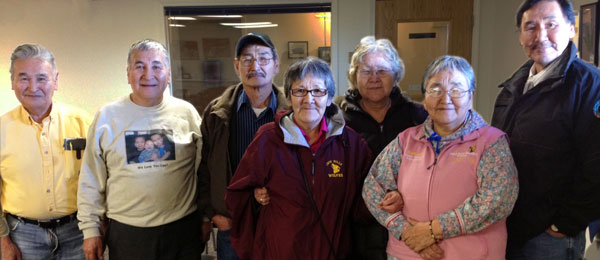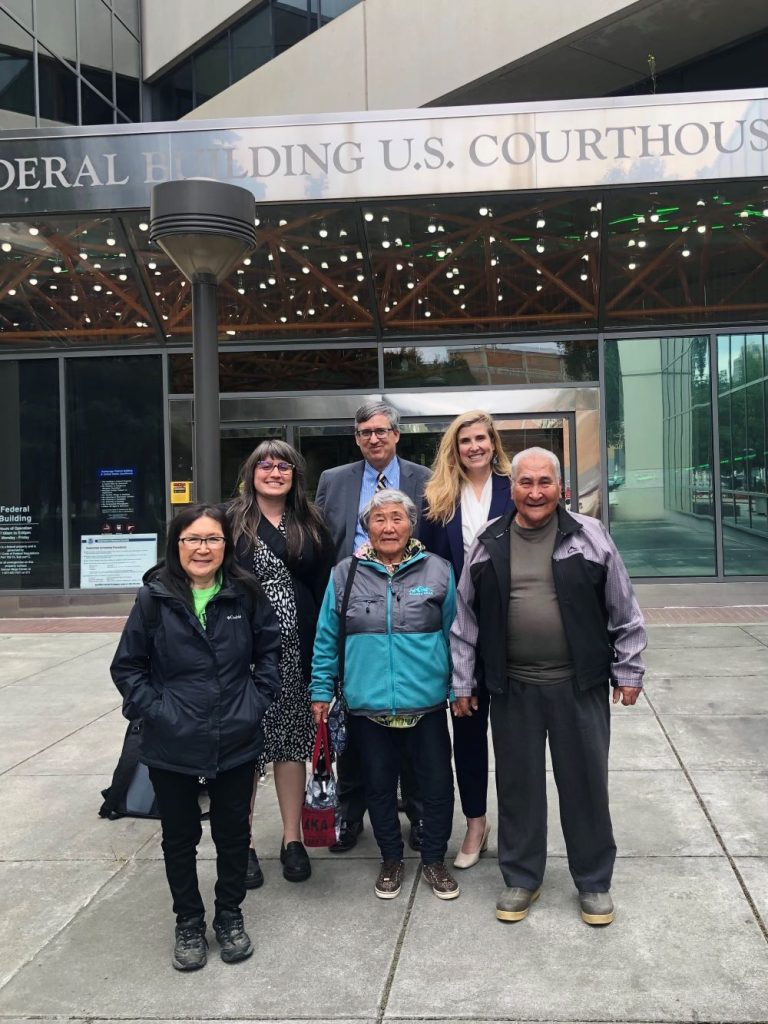Alaska Native voters and Alaska Tribes successfully sued the State of Alaska, forcing it to comply with the language assistance provisions of the Voting Rights Act and the voting guarantees of the 14th and 15th Amendments to the U.S. Constitution. Because the State of Alaska has never fully complied with the federal court order, NARF continues to monitor the state’s language assistance program and the court continues to have jurisdiction over the case. In August 2023, the court extended the settlement agreement for this case through 2026.
The Litigation
In 2013, NARF and co-counsel, brought suit on behalf of Arctic Village Council, Native Village of Hooper Bay, Traditional Village of Togiak, Venetie Village Council, and two individual Alaska Native voters, against the Alaska Division of Elections and Alaska Lieutenant Governor to enforce the guarantee of language assistance under Section 203 of the Voting Rights Act (VRA) and the voting guarantees of the Fourteenth and Fifteenth Amendments of the United States Constitution. The suit alleged that state officials had for decades failed to provide language assistance to Alaska Native voters as required by Section 203 of the VRA. The suit further alleged that plaintiffs were unable to meaningfully participate in the electoral process because of the State of Alaska’s failure to comply with language assistance requirements. (At the time, the case was captioned as Toyukak v. Treadwell, but it now is Toyukak v. Dahlstrom.)
Multiple regions of Alaska, including the Dillingham and Kusilvak census areas, are required to provide language assistance for Alaska Natives under Section 203. Section 203 applies to states and localities that meet certain threshold requirements based on the number of voting-age citizens with limited English proficiency. “Language assistance” requires translating ballots and other election materials and information into covered Alaska Native languages and providing trained bilingual staff to register voters and to help voters at the polls. Election officials cannot provide less election information to Alaska-Native-language-speaking voters than they provide to English-speaking voters.

Lead plaintiff Mike Toyukak of Manokotak Village explained through a translator that he needed to receive voting information in Yup’ik so “[he] would be able to understand what [he’s] voting for.” Plaintiff Fred Augustine of the Village of Alakanuk elaborated, saying through a translator, “Sometimes I wonder if my votes count. Poll workers speak to me in English, but I don’t understand. I didn’t understand any of the ballots but I still voted. We go to vote and vote, but we don’t know what to do and how to vote.”
An extensive trial was held in June and July 2014, and Alaska’s federal district court delivered an oral decision on September 3, 2014. The court held that the State of Alaska had in fact violated Section 203 of the VRA in all the regions at issue. The court further found that the State of Alaska had improperly relied on what it called “outreach workers” in Alaska Native communities to translate the entire election pamphlet themselves, even though these workers had never been asked to do so and there was no evidence showing they could do this. Furthermore, the court found that the end result was an absence of all pre-election information such as candidate statements, ballot measures, pro and con statements for ballot measures, and all other information available to English speaking voters before an election. After briefing, the court ordered broad remedial relief including the written and audio translation of all pre-election materials distributed in English and posting of bilingual translators at all polling places. The court also ordered the State of Alaska to report back on its progress for subsequent elections.
NARF and our clients spent several months in an extended negotiation with the State of Alaska to settle the case. On September 30, 2015, the federal district court approved a settlement agreement with the Alaska Division of Elections and Alaska Lieutenant Governor that provided broad relief in the form of a comprehensive language assistance program. Unfortunately, the State of Alaska has never meaningfully complied with the stipulated order, and the case is still under federal court supervision.

On August 31, 2023, the U.S. District Court for the District of Alaska approved a settlement designed to ensure the State of Alaska provides legally required language assistance for Alaska Native voters. The settlement extends the terms of earlier agreements to now remain in place until December 31, 2026. The plaintiffs worked with the state to create an action plan to make the positive changes outlined in the now extended order. The plan describes how the state will offer translation services, translated materials, and Yup’ik language assistance in the Dillingham and Kusilvak census areas.
More Cases

